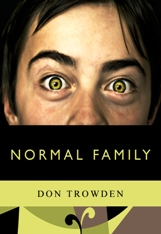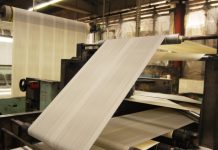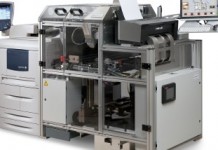By Caleb Mason
 As a small publisher of literary fiction, I am very grateful to have a retail resource like Espresso On- Demand Books.
As a small publisher of literary fiction, I am very grateful to have a retail resource like Espresso On- Demand Books.
Publerati will have three titles available through the Espresso Book Machine Network this spring, and although there are a number of unique challenges to marketing and selling books this way in the current retail climate, I remain optimistic that this, or something similar to follow, will be an important part of future print book distribution. The three available Publerati titles are Normal Family by Don Trowden, Dancing in the Kitchen by Susan Sterling, and Thanksgiving by Ellen Cooney.
The first thing one has to accept is the eventual disappearance of most standalone bookstores. Ouch. I know, that hurts, and as a former bookseller myself I wish it were not so, but all the trends of the past ten years in book and other retailing (e.g., music, software, photos, DVD movies, florists, post offices) point to this reality.
In a future world where only the bestsellers and illustrated books are preprinted and sold mostly not through bookstores but in mass market channels like Target, supermarkets, and Amazon, how will the rest of the industry’s titles make it into print? How many standalone classes of retail trade can you think of in this day and age of the “huge general store”? Why should books be any different and deserve their own dedicated space in the era of the store-within-store?
I wonder how Big Publishing will distribute the needed quantities of preprinted books when Barnes & Noble is gone. B&N is already barely surviving due to selling more non-book items, while quietly closing underperforming stores, so this trend is established. These trends don’t just simply turn around and change direction suddenly because we hope they will. The only way B&N might survive is to become a general store themselves, with less merchandising space given to lower margin books. Which is what they have been doing and so have indie bookstores. For years.
My experience with On-Demand Books has been excellent. I received the necessary advance training to learn how to format and upload our titles correctly. Because the machines are so groundbreaking and mostly under-utilized in these early days, the operators at the various locations have been open to hearing from me as a small publisher and working together on store signings and promotions. There is no way I would get similar attention from the current physical book channels.
As a publisher, this changes how books are discovered in a similar way to ebooks. I don’t have the opportunity for “stumble-and-find” retail book browsing, which I know is very important. So I have to direct market to my own list of ebook purchasers and opt-in newsletter subscribers the news that they can now go anywhere in the world where an Espresso Book Machine exists and request a printed copy.
I believe in the digital-first, print-second approach for the future of most entertainment content. Pay less for a digital copy and then only buy a print edition if you want to own it. You know…hold it. Sleep with it. MP3, vinyl. Whatever you’re into.
For Publerati, having all our literary fiction titles available through the most popular ebook channels and then also in print at retail via Espresso On-Demand, constitutes a new business model I can believe in for the future. And one great benefit of this new efficiency is we can pay our authors the bulk of the royalties while also donating to literacy charities like Worldreader.
Caleb Mason is Founder and Publisher of Publerati.

































